7 Tips on Dealing With Your Anxiety

Anxiety is one of the most common problems in modern life – not just worrying about some particular thing, but a general sense of worry that won’t go away. What can you do if you experience it? Here are some suggestions…
Acceptance
Accept how you feel. Anxiety can ramp up in a vicious circle, driven by a fear of feeling bad. This means that an initial sense of unease can build up into a ‘panic attack’: I’m worried now, and it’s going to get worse, and it has got worse… Instead, allow yourself to feel anxious. There is a balance to be struck, between pushing the feeling away too actively, which risks setting up the ‘fear of a future feeling’ cycle again, and overly embracing it. If striking such a balance sounds difficult, mindfulness is of huge help here. The practice of mindfulness teaches us to observe and accept emotions, thoughts and mental states in a calm, observational way – a way that has often been compared to someone watching clouds on a summer day. I cover my favourite patterns in our free meditation app, which is now available to download on Googleplay and the App Store.
Express Yourself!
Sometimes anxiety is caused by a cycle of avoiding dealing with issues in your life. Learning to express your needs can help without letting worry ‘build up’ to some sort of breaking point. If you find it difficult to do this, take small steps to test yourself with people you spend time with. Often anxiety is reduced when you assert a boundary and simply say ‘no’ to someone.
Be Introspective – How is my ‘Self Talk’?
Anxiety can also come about by frequent thinking of unrealistic wants and expectations which effectively wind ourselves up. Check your language and ‘self-talk’ for this type of thinking. Notice the phrases and words you use. Some of them can increase anxiety by painting the world as an excessively black-and-white, judgemental place, in which you have little power. Examples of such words are ‘always, never, must, should, can’t’. Watch out for thoughts like ‘Everybody will dislike me if…’ Stop the self-talk, replay these sentences to yourself and ask, “Does this thought make me feel better?” if the answer is ‘no’, stop using the words.
Distraction
Distract yourself. If the anxiety loop is beginning to build, find something else to do that takes your mind away from it and directs your attention elsewhere. Although this may sound obvious, the saying ‘Idle hands are the devil’s tools’ applies here. It can take additional mental resources to ‘do something’, but it is worth it. Arrange to see or speak to friends and family. Listen to, read or watch something. Catch up with chores or perhaps go for a walk or for an outing. Distraction is often the best way to move out of anxious states.
Seek Support
If anxiety becomes a permanent, or even common, part of your life, seek support. The simple act of sharing your feelings with another person, who is both caring and experienced in the field, can often be hugely helpful. Their perspective can make a huge difference. A therapist or coach can give you new ways to approach anxiety. There are also online resources that can offer support free of charge.
NLP
Study NLP. There are a number of processes that allow you reinterpret past experiences, or act out future events that worry you so you can deal with them effectively. There are techniques that allow you to utilise experiences you are ‘good at’ to help you deal with more challenging contexts. The Circle of Excellence is a classic example (I teach it on my NLP Practitioner course). The essence of this technique is that you create a ‘safe’ physical space in your environment, which you can then ‘fill’ with helpful memories and mental states. You can then step into the circle and access these memories and states. Surprisingly, the anxiety often melts away. To non NLP-ers, this may sound strange, but it works, because of the mind’s powerful associative abilities.
Step back to reality
Ask yourself ‘what is the worst that really can happen?’, then imagine how you would actually deal with this. This technique, called ‘reality testing’, comes from Cognitive Behavioural Therapy, the choice of therapy in the NHS.
It’s often said we live in an Age of Anxiety (the term comes from a WH Auden poem published in 1948). But we also live in an age when there are plenty of ways of tackling it. A great way of looking at anxiety is as a message that you need to learn a new set of skills, much in the way you have already acquired skills in so many other parts of your life. These new skills are healthy and, importantly, put you back in control of your life.
Did you like this post?
Then check out our events and courses!
Where to find us
For posts, events, free open days and more, follow NLP School on:
What to read next
Improve Your Confidence With NLP









